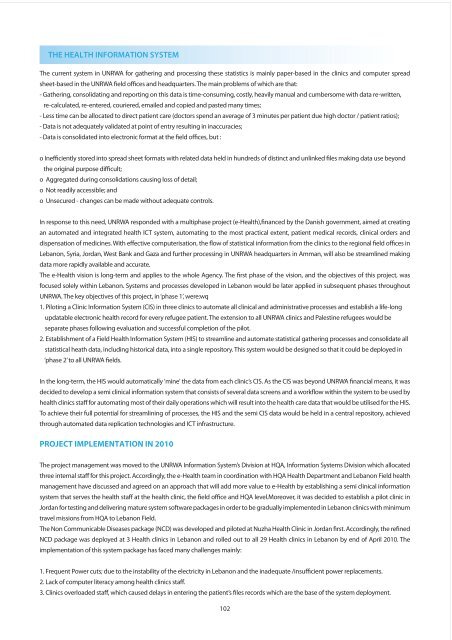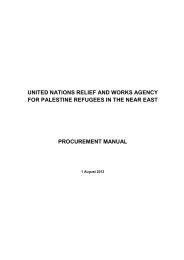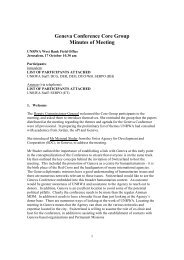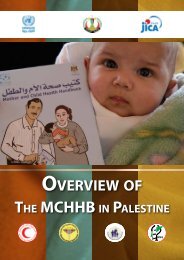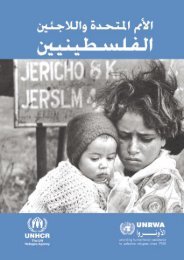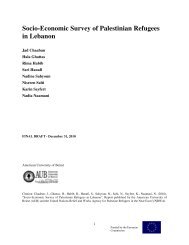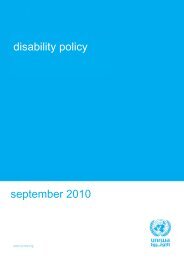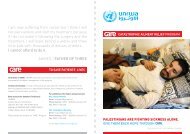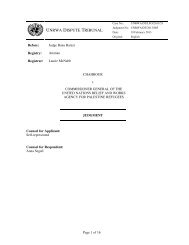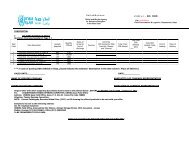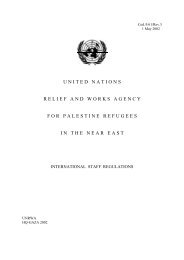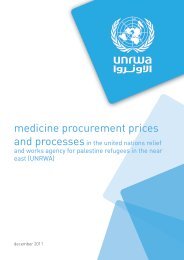Annual Report of the Department of Health 2010 - Unrwa
Annual Report of the Department of Health 2010 - Unrwa
Annual Report of the Department of Health 2010 - Unrwa
Create successful ePaper yourself
Turn your PDF publications into a flip-book with our unique Google optimized e-Paper software.
THE HEALTH INFORMATION SYSTEM<br />
The current system in UNRWA for ga<strong>the</strong>ring and processing <strong>the</strong>se statistics is mainly paper-based in <strong>the</strong> clinics and computer spread<br />
sheet-based in <strong>the</strong> UNRWA field <strong>of</strong>fices and headquarters. The main problems <strong>of</strong> which are that:<br />
- Ga<strong>the</strong>ring, consolidating and reporting on this data is time-consuming, costly, heavily manual and cumbersome with data re-written,<br />
re-calculated, re-entered, couriered, emailed and copied and pasted many times;<br />
- Less time can be allocated to direct patient care (doctors spend an average <strong>of</strong> 3 minutes per patient due high doctor / patient ratios);<br />
- Data is not adequately validated at point <strong>of</strong> entry resulting in inaccuracies;<br />
- Data is consolidated into electronic format at <strong>the</strong> field <strong>of</strong>fices, but :<br />
o Inefficiently stored into spread sheet formats with related data held in hundreds <strong>of</strong> distinct and unlinked files making data use beyond<br />
<strong>the</strong> original purpose difficult;<br />
o Aggregated during consolidations causing loss <strong>of</strong> detail;<br />
o Not readily accessible; and<br />
o Unsecured - changes can be made without adequate controls.<br />
In response to this need, UNRWA responded with a multiphase project (e-<strong>Health</strong>),financed by <strong>the</strong> Danish government, aimed at creating<br />
an automated and integrated health ICT system, automating to <strong>the</strong> most practical extent, patient medical records, clinical orders and<br />
dispensation <strong>of</strong> medicines. With effective computerisation, <strong>the</strong> flow <strong>of</strong> statistical information from <strong>the</strong> clinics to <strong>the</strong> regional field <strong>of</strong>fices in<br />
Lebanon, Syria, Jordan, West Bank and Gaza and fur<strong>the</strong>r processing in UNRWA headquarters in Amman, will also be streamlined making<br />
data more rapidly available and accurate.<br />
The e-<strong>Health</strong> vision is long-term and applies to <strong>the</strong> whole Agency. The first phase <strong>of</strong> <strong>the</strong> vision, and <strong>the</strong> objectives <strong>of</strong> this project, was<br />
focused solely within Lebanon. Systems and processes developed in Lebanon would be later applied in subsequent phases throughout<br />
UNRWA. The key objectives <strong>of</strong> this project, in ‘phase 1’, were:wq<br />
1. Piloting a Clinic Information System (CIS) in three clinics to automate all clinical and administrative processes and establish a life-long<br />
updatable electronic health record for every refugee patient. The extension to all UNRWA clinics and Palestine refugees would be<br />
separate phases following evaluation and successful completion <strong>of</strong> <strong>the</strong> pilot.<br />
2. Establishment <strong>of</strong> a Field <strong>Health</strong> Information System (HIS) to streamline and automate statistical ga<strong>the</strong>ring processes and consolidate all<br />
statistical heath data, including historical data, into a single repository. This system would be designed so that it could be deployed in<br />
‘phase 2’ to all UNRWA fields.<br />
In <strong>the</strong> long-term, <strong>the</strong> HIS would automatically 'mine' <strong>the</strong> data from each clinic’s CIS. As <strong>the</strong> CIS was beyond UNRWA financial means, it was<br />
decided to develop a semi clinical information system that consists <strong>of</strong> several data screens and a workflow within <strong>the</strong> system to be used by<br />
health clinics staff for automating most <strong>of</strong> <strong>the</strong>ir daily operations which will result into <strong>the</strong> health care data that would be utilised for <strong>the</strong> HIS.<br />
To achieve <strong>the</strong>ir full potential for streamlining <strong>of</strong> processes, <strong>the</strong> HIS and <strong>the</strong> semi CIS data would be held in a central repository, achieved<br />
through automated data replication technologies and ICT infrastructure.<br />
PROJECT IMPLEMENTATION IN <strong>2010</strong><br />
The project management was moved to <strong>the</strong> UNRWA Information System’s Division at HQA, Information Systems Division which allocated<br />
three internal staff for this project. Accordingly, <strong>the</strong> e-<strong>Health</strong> team in coordination with HQA <strong>Health</strong> <strong>Department</strong> and Lebanon Field health<br />
management have discussed and agreed on an approach that will add more value to e-<strong>Health</strong> by establishing a semi clinical information<br />
system that serves <strong>the</strong> health staff at <strong>the</strong> health clinic, <strong>the</strong> field <strong>of</strong>fice and HQA level.Moreover, it was decided to establish a pilot clinic in<br />
Jordan for testing and delivering mature system s<strong>of</strong>tware packages in order to be gradually implemented in Lebanon clinics with minimum<br />
travel missions from HQA to Lebanon Field.<br />
The Non Communicable Diseases package (NCD) was developed and piloted at Nuzha <strong>Health</strong> Clinic in Jordan first. Accordingly, <strong>the</strong> refined<br />
NCD package was deployed at 3 <strong>Health</strong> clinics in Lebanon and rolled out to all 29 <strong>Health</strong> clinics in Lebanon by end <strong>of</strong> April <strong>2010</strong>. The<br />
implementation <strong>of</strong> this system package has faced many challenges mainly:<br />
1. Frequent Power cuts; due to <strong>the</strong> instability <strong>of</strong> <strong>the</strong> electricity in Lebanon and <strong>the</strong> inadequate /insufficient power replacements.<br />
2. Lack <strong>of</strong> computer literacy among health clinics staff.<br />
3. Clinics overloaded staff, which caused delays in entering <strong>the</strong> patient’s files records which are <strong>the</strong> base <strong>of</strong> <strong>the</strong> system deployment.<br />
102


